tire type NISSAN SENTRA 2010 B17 / 7.G Towing Guide
[x] Cancel search | Manufacturer: NISSAN, Model Year: 2010, Model line: SENTRA, Model: NISSAN SENTRA 2010 B17 / 7.GPages: 30, PDF Size: 1.01 MB
Page 2 of 30
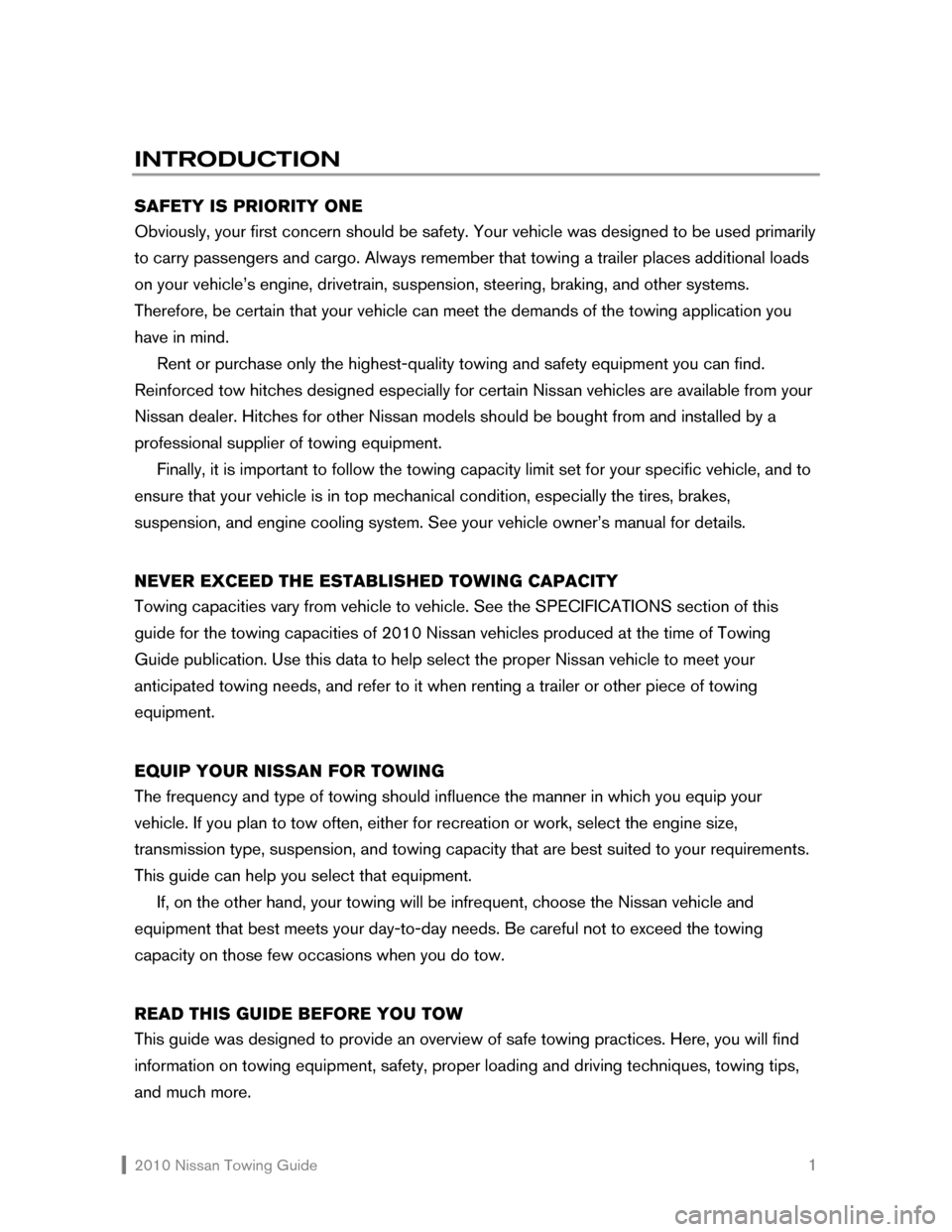
2010 Nissan Towing Guide 1
INTRODUCTION
SAFETY IS PRIORITY ONE
Obviously, your first concern should be safety. Your vehicle was designed to be used primarily
to carry passengers and cargo. Always remember that towing a trailer places additional loads
on your vehicle’s engine, drivetrain, suspension, steering, braking, and other systems.
Therefore, be certain that your vehicle can meet the demands of the towing application you
have in mind.
Rent or purchase only the highest-quality towing and safety equipment you can find.
Reinforced tow hitches designed especially for certain Nissan vehicles are available from your
Nissan dealer. Hitches for other Nissan models should be bought from and installed by a
professional supplier of towing equipment.
Finally, it is important to follow the towing capacity limit set for your specific vehicle, and to
ensure that your vehicle is in top mechanical condition, especially the tires, brakes,
suspension, and engine cooling system. See your vehicle owner’s manual for details.
NEVER EXCEED THE ESTABLISHED TOWING CAPACITY
Towing capacities vary from vehicle to vehicle. See the SPECIFICATIONS section of this
guide for the towing capacities of 2010 Nissan vehicles produced at the time of Towing
Guide publication. Use this data to help select the proper Nissan vehicle to meet your
anticipated towing needs, and refer to it when renting a trailer or other piece of towing
equipment.
EQUIP YOUR NISSAN FOR TOWING
The frequency and type of towing should influence the manner in which you equip your
vehicle. If you plan to tow often, either for recreation or work, select the engine size,
transmission type, suspension, and towing capacity that are best suited to your requirements.
This guide can help you select that equipment.
If, on the other hand, your towing will be infrequent, choose the Nissan vehicle and
equipment that best meets your day-to-day needs. Be careful not to exceed the towing
capacity on those few occasions when you do tow.
READ THIS GUIDE BEFORE YOU TOW
This guide was designed to provide an overview of safe towing practices. Here, you will find
information on towing equipment, safety, proper loading and driving techniques, towing tips,
and much more.
Page 3 of 30
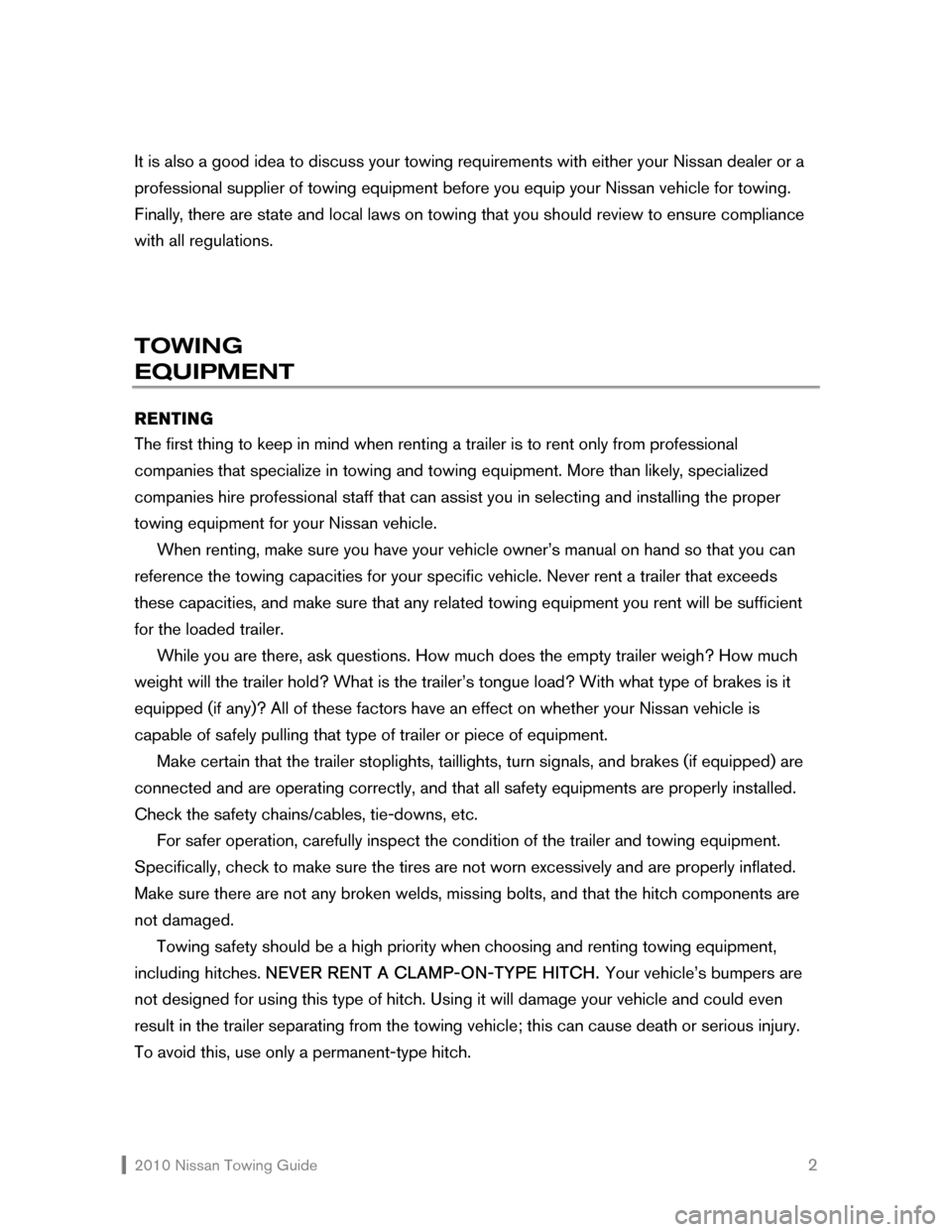
2010 Nissan Towing Guide 2 It is also a good idea to discuss your towing requirements with either your Nissan dealer or a
professional supplier of towing equipment before you equip your Nissan vehicle for towing.
Finally, there are state and local laws on towing that you should review to ensure compliance
with all regulations.
TOWING
EQUIPMENT
RENTING
The first thing to keep in mind when renting a trailer is to rent only from professional
companies that specialize in towing and towing equipment. More than likely, specialized
companies hire professional staff that can assist you in selecting and installing the proper
towing equipment for your Nissan vehicle.
When renting, make sure you have your vehicle owner’s manual on hand so that you can
reference the towing capacities for your specific vehicle. Never rent a trailer that exceeds
these capacities, and make sure that any related towing equipment you rent will be sufficient
for the loaded trailer.
While you are there, ask questions. How much does the empty trailer weigh? How much
weight will the trailer hold? What is the trailer’s tongue load? With what type of brakes is it
equipped (if any)? All of these factors have an effect on whether your Nissan vehicle is
capable of safely pulling that type of trailer or piece of equipment.
Make certain that the trailer stoplights, taillights, turn signals, and brakes (if equipped) are
connected and are operating correctly, and that all safety equipments are properly installed.
Check the safety chains/cables, tie-downs, etc.
For safer operation, carefully inspect the condition of the trailer and towing equipment.
Specifically, check to make sure the tires are not worn excessively and are properly inflated.
Make sure there are not any broken welds, missing bolts, and that the hitch components are
not damaged.
Towing safety should be a high priority when choosing and renting towing equipment,
including hitches. NEVER RENT A CLAMP-ON-TYPE HITCH. Your vehicle’s bumpers are
not designed for using this type of hitch. Using it will damage your vehicle and could even
result in the trailer separating from the towing vehicle; this can cause death or serious injury.
To avoid this, use only a permanent-type hitch.
Page 5 of 30
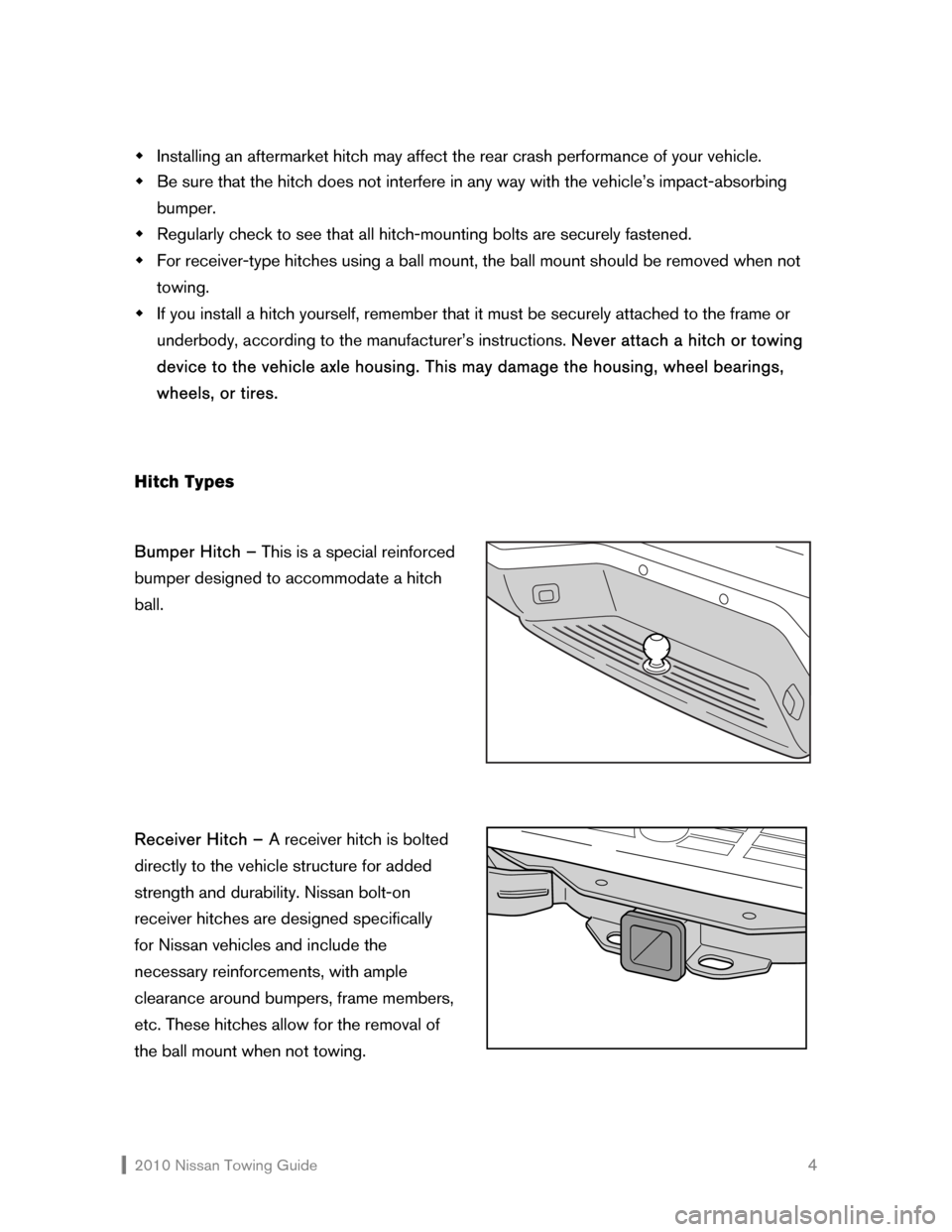
2010 Nissan Towing Guide 4 �Š Installing an aftermarket hitch may affect the rear crash performance of your vehicle.
�Š Be sure that the hitch does not interfere in any way with the vehicle’s impact-absorbing
bumper.
�Š Regularly check to see that all hitch-mounting bolts are securely fastened.
�Š For receiver-type hitches using a ball mount, the ball mount should be removed when not
towing.
�Š If you install a hitch yourself, remember that it must be securely attached to the frame or
underbody, according to the manufacturer’s instructions. Never attach a hitch or towing
device to the vehicle axle housing. This may damage the housing, wheel bearings,
wheels, or tires.
Hitch Types
Bumper Hitch – This is a special reinforced
bumper designed to accommodate a hitch
ball.
Receiver Hitch – A receiver hitch is bolted
directly to the vehicle structure for added
strength and durability. Nissan bolt-on
receiver hitches are designed specifically
for Nissan vehicles and include the
necessary reinforcements, with ample
clearance around bumpers, frame members,
etc. These hitches allow for the removal of
the ball mount when not towing.
Page 6 of 30
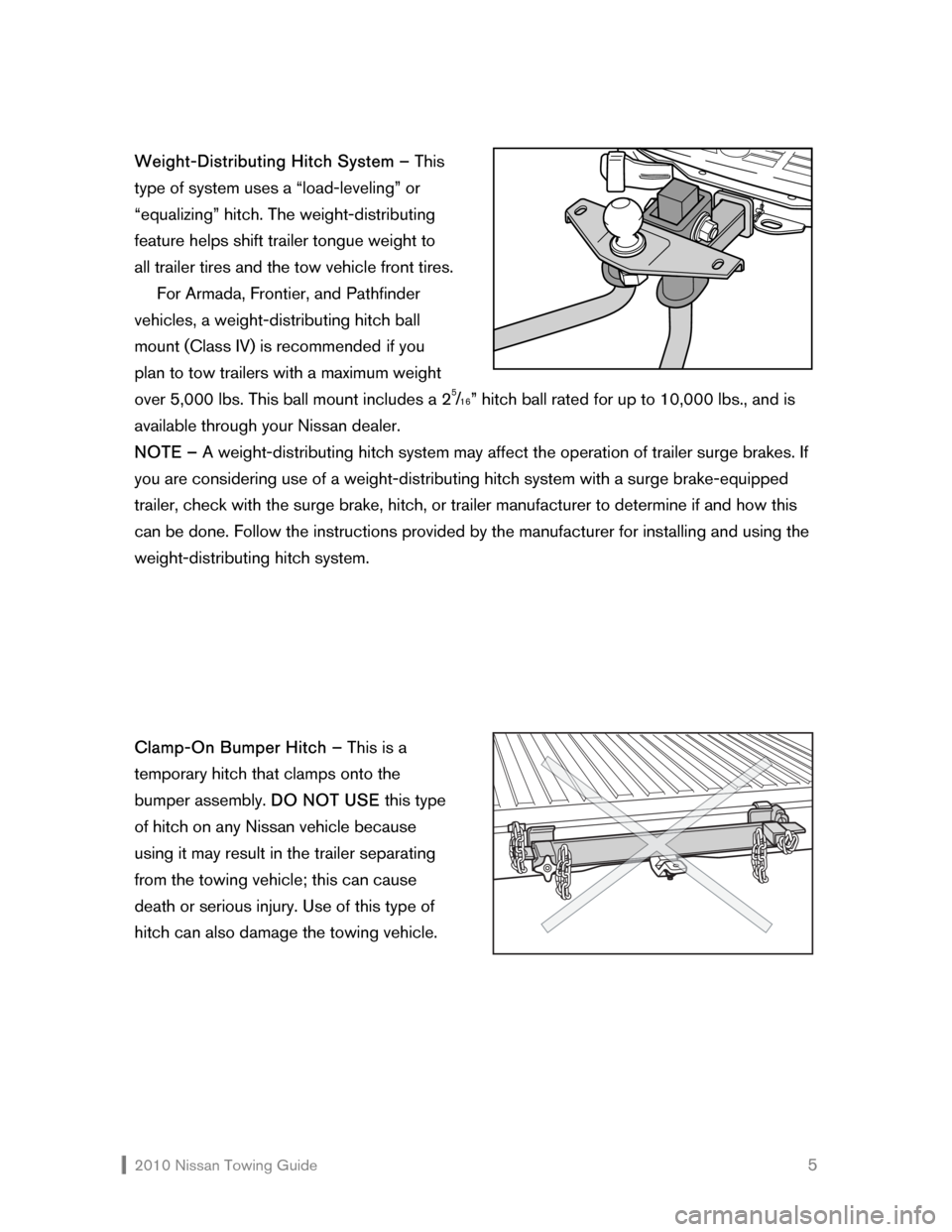
2010 Nissan Towing Guide 5 Weight-Distributing Hitch System – This
type of system uses a “load-leveling” or
“equalizing” hitch. The weight-distributing
feature helps shift trailer tongue weight to
all trailer tires and the tow vehicle front tires.
For Armada, Frontier, and Pathfinder
vehicles, a weight-distributing hitch ball
mount (Class IV) is recommended if you
plan to tow trailers with a maximum weight
over 5,000 lbs. This ball mount includes a 2
5/16” hitch ball rated for up to 10,000 lbs., and is
available through your Nissan dealer.
NOTE – A weight-distributing hitch system may affect the operation of trailer surge brakes. If
you are considering use of a weight-distributing hitch system with a surge brake-equipped
trailer, check with the surge brake, hitch, or trailer manufacturer to determine if and how this
can be done. Follow the instructions provided by the manufacturer for installing and using the
weight-distributing hitch system.
Clamp-On Bumper Hitch – This is a
temporary hitch that clamps onto the
bumper assembly. DO NOT USE this type
of hitch on any Nissan vehicle because
using it may result in the trailer separating
from the towing vehicle; this can cause
death or serious injury. Use of this type of
hitch can also damage the towing vehicle.
Page 13 of 30
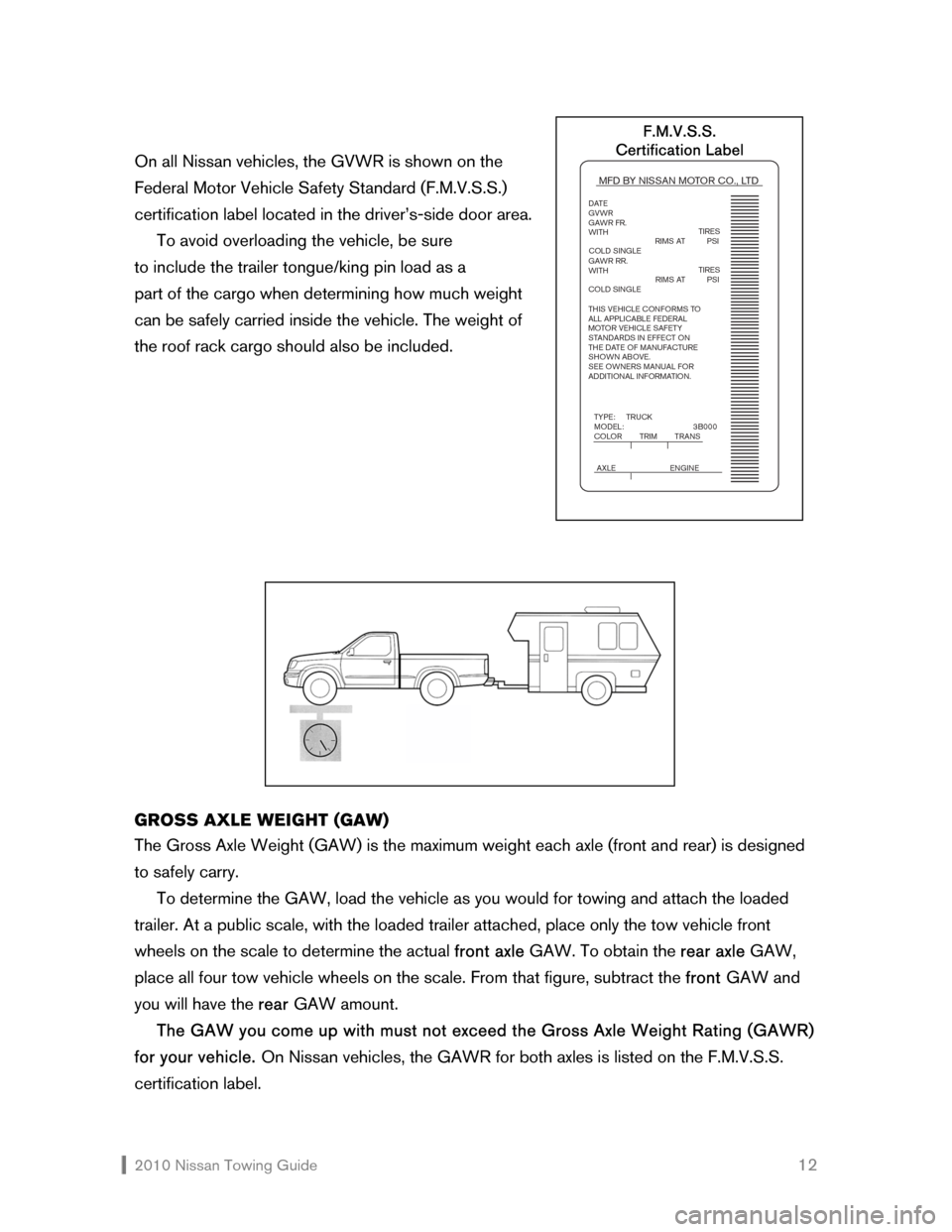
2010 Nissan Towing Guide 12 On all Nissan vehicles, the GVWR is shown on the
Federal Motor Vehicle Safety Standard (F.M.V.S.S.)
certification label located in the driver’s-side door area.
To avoid overloading the vehicle, be sure
to include the trailer tongue/king pin load as a
part of the cargo when determining how much weight
can be safely carried inside the vehicle. The weight of
the roof rack cargo should also be included.
GROSS AXLE WEIGHT (GAW)
The Gross Axle Weight (GAW) is the maximum weight each axle (front and rear) is designed
to safely carry.
To determine the GAW, load the vehicle as you would for towing and attach the loaded
trailer. At a public scale, with the loaded trailer attached, place only the tow vehicle front
wheels on the scale to determine the actual front axle GAW. To obtain the rear axle GAW,
place all four tow vehicle wheels on the scale. From that figure, subtract the front GAW and
you will have the rear GAW amount.
The GAW you come up with must not exceed the Gross Axle Weight Rating (GAWR)
for your vehicle. On Nissan vehicles, the GAWR for both axles is listed on the F.M.V.S.S.
certification label.
MFD BY NISSAN MOTOR CO., LTD
DATE
GVWR
GAWR FR.
WITH
GAWR RR.
WITH
THIS VEHICLE CONFORMS TO
ALL APPLICABLE FEDERAL
MOTOR VEHICLE SAFETY
STANDARDS IN EFFECT ON
THE DATE OF MANUFACTURE
SHOWN ABOVE.
SEE OWNERS MANUAL FOR
ADDITIONAL INFORMATION.
TIRES
TIRES
TYPE: TRUCK
MODEL: 3B000
COLOR TRIM TRANS
AXLE ENGINE
RIMS AT PSI
COLD SINGLERIMS AT PSI
COLD SINGLE
F.M.V.S.S.
Certification Label
Page 15 of 30
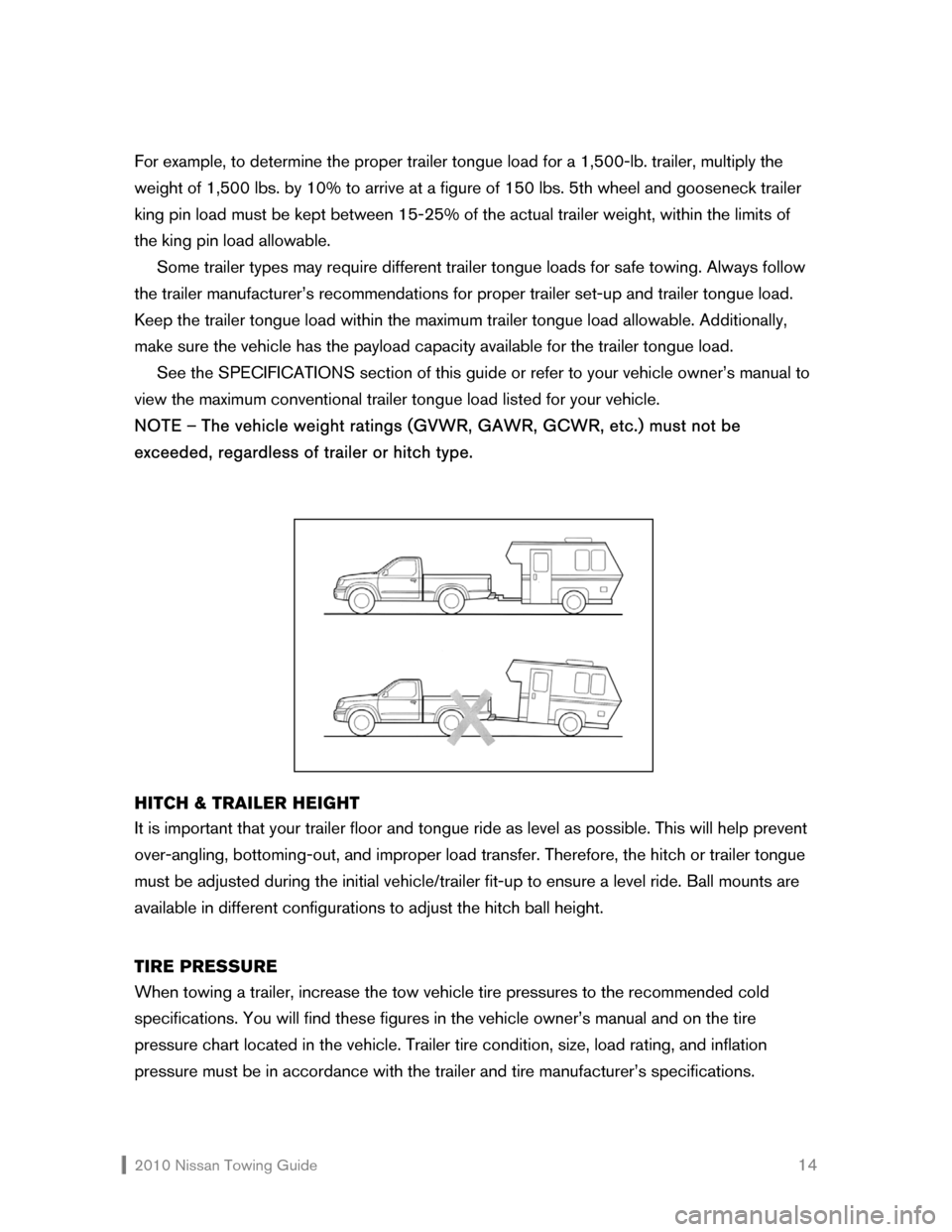
2010 Nissan Towing Guide 14 For example, to determine the proper trailer tongue load for a 1,500-lb. trailer, multiply the
weight of 1,500 lbs. by 10% to arrive at a figure of 150 lbs. 5th wheel and gooseneck trailer
king pin load must be kept between 15-25% of the actual trailer weight, within the limits of
the king pin load allowable.
Some trailer types may require different trailer tongue loads for safe towing. Always follow
the trailer manufacturer’s recommendations for proper trailer set-up and trailer tongue load.
Keep the trailer tongue load within the maximum trailer tongue load allowable. Additionally,
make sure the vehicle has the payload capacity available for the trailer tongue load.
See the SPECIFICATIONS section of this guide or refer to your vehicle owner’s manual to
view the maximum conventional trailer tongue load listed for your vehicle.
NOTE – The vehicle weight ratings (GVWR, GAWR, GCWR, etc.) must not be
exceeded, regardless of trailer or hitch type.
HITCH & TRAILER HEIGHT
It is important that your trailer floor and tongue ride as level as possible. This will help prevent
over-angling, bottoming-out, and improper load transfer. Therefore, the hitch or trailer tongue
must be adjusted during the initial vehicle/trailer fit-up to ensure a level ride. Ball mounts are
available in different configurations to adjust the hitch ball height.
TIRE PRESSURE
When towing a trailer, increase the tow vehicle tire pressures to the recommended cold
specifications. You will find these figures in the vehicle owner’s manual and on the tire
pressure chart located in the vehicle. Trailer tire condition, size, load rating, and inflation
pressure must be in accordance with the trailer and tire manufacturer’s specifications.
Page 23 of 30
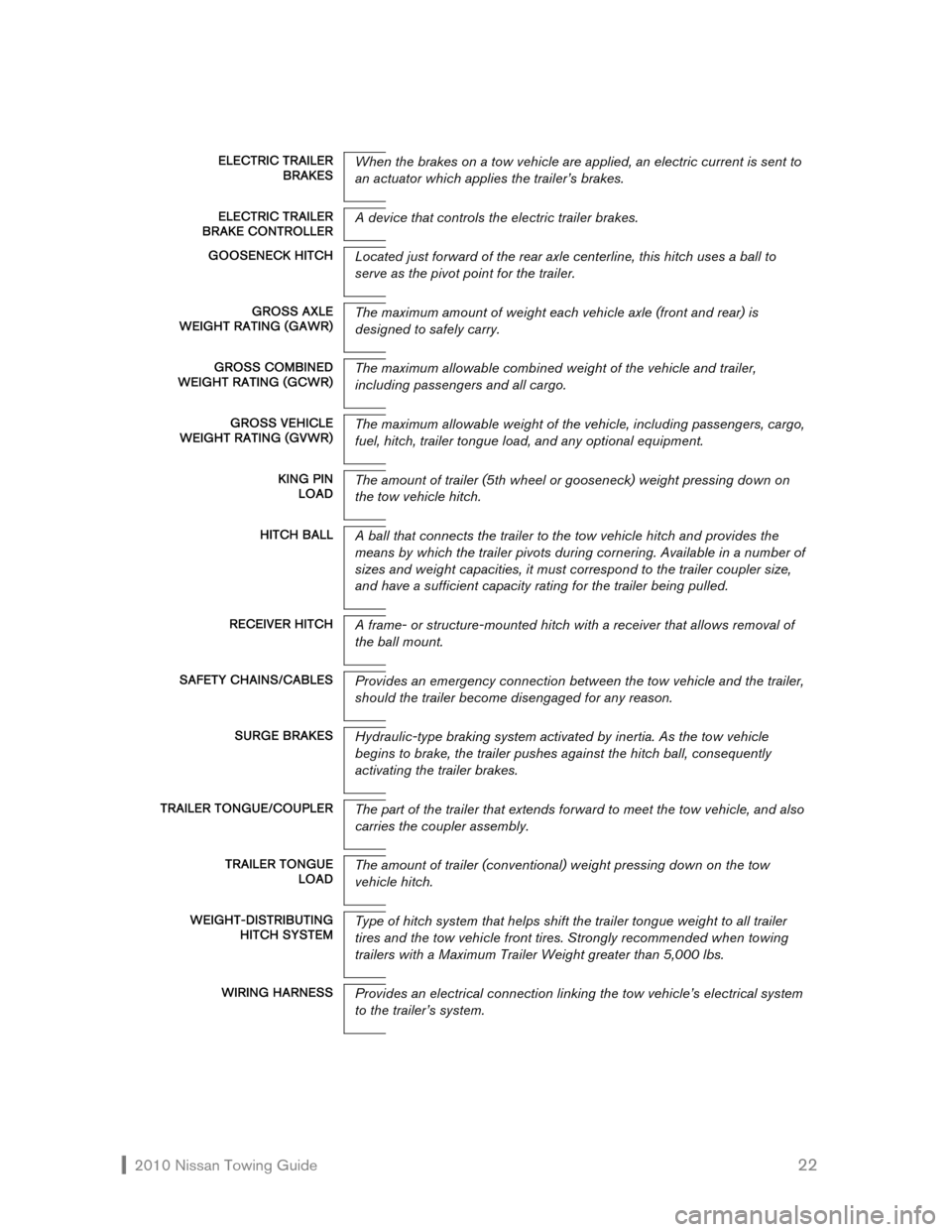
2010 Nissan Towing Guide 22
ELECTRIC TRAILER
BRAKES When the brakes on a tow vehicle are applied, an electric current is sent to
an actuator which applies the trailer’s brakes.
ELECTRIC TRAILER
BRAKE CONTROLLER A device that controls the electric trailer brakes.
GOOSENECK HITCH Located just forward of the rear axle centerline, this hitch uses a ball to
serve as the pivot point for the trailer.
GROSS AXLE
WEIGHT RATING (GAWR)
The maximum amount of weight each vehicle axle (front and rear) is
designed to safely carry.
GROSS COMBINED
WEIGHT RATING (GCWR) The maximum allowable combined weight of the vehicle and trailer,
including passengers and all cargo.
GROSS VEHICLE
WEIGHT RATING (GVWR) The maximum allowable weight of the vehicle, including passengers, cargo,
fuel, hitch, trailer tongue load, and any optional equipment.
KING PIN
LOAD The amount of trailer (5th wheel or gooseneck) weight pressing down on
the tow vehicle hitch.
HITCH BALL
A ball that connects the trailer to the tow vehicle hitch and provides the
means by which the trailer pivots during cornering. Available in a number of
sizes and weight capacities, it must correspond to the trailer coupler size,
and have a sufficient capacity rating for the trailer being pulled.
RECEIVER HITCH A frame- or structure-mounted hitch with a receiver that allows removal of
the ball mount.
SAFETY CHAINS/CABLES Provides an emergency connection between the tow vehicle and the trailer,
should the trailer become disengaged for any reason.
SURGE BRAKES
Hydraulic-type braking system activated by inertia. As the tow vehicle
begins to brake, the trailer pushes against the hitch ball, consequently
activating the trailer brakes.
TRAILER TONGUE/COUPLER The part of the trailer that extends forward to meet the tow vehicle, and also
carries the coupler assembly.
TRAILER TONGUE
LOAD The amount of trailer (conventional) weight pressing down on the tow
vehicle hitch.
WEIGHT-DISTRIBUTING
HITCH SYSTEM Type of hitch system that helps shift the trailer tongue weight to all trailer
tires and the tow vehicle front tires. Strongly recommended when towing
trailers with a Maximum Trailer Weight greater than 5,000 lbs.
WIRING HARNESS
Provides an electrical connection linking the tow vehicle’s electrical system
to the trailer’s system.